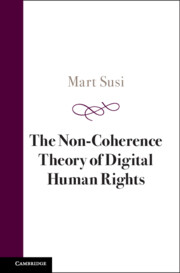Book contents
- The Non-coherence Theory of Digital Human Rights
- The Non-coherence Theory of Digital Human Rights
- Copyright page
- Contents
- Acknowledgements
- Introduction
- Part I The Contextual Challenges and Purpose of the Non-coherence Theory of Digital Human Rights
- Part II Reflections on Some Theories and Doctrines
- Part III The Core Elements of Non-coherence Theory
- Part IV The Impact of the Non-coherence Theory
- Part V Internet Balancing Formula
- 21 The Internet Balancing Formula
- 22 Robert Alexy’s Views on the Internet Balancing Formula
- 23 Reply to Alexy Critique
- 24 The Debate
- In Lieu of the Concluding Remarks
- Index
24 - The Debate
from Part V - Internet Balancing Formula
Published online by Cambridge University Press: 22 February 2024
- The Non-coherence Theory of Digital Human Rights
- The Non-coherence Theory of Digital Human Rights
- Copyright page
- Contents
- Acknowledgements
- Introduction
- Part I The Contextual Challenges and Purpose of the Non-coherence Theory of Digital Human Rights
- Part II Reflections on Some Theories and Doctrines
- Part III The Core Elements of Non-coherence Theory
- Part IV The Impact of the Non-coherence Theory
- Part V Internet Balancing Formula
- 21 The Internet Balancing Formula
- 22 Robert Alexy’s Views on the Internet Balancing Formula
- 23 Reply to Alexy Critique
- 24 The Debate
- In Lieu of the Concluding Remarks
- Index
Summary
The academic debate which emerged after the first introduction of the IBF concerns either directly the formula, or matters closely connected to the balancing of conflicting rights by private online portals. The article reviews some positions and offers alternative views. In general, capabilities variance leads to an image of weakened or absent legitimacy of online content assessment only through the lens of the offline assessment framework, that is, when one wishes to ask the same questions and apply similar tools towards both domains. Legitimacy in the online domain may, however, originate from enforced consent, or it may have a default and undefined origin, which may lead to questioning the suitability of the legitimacy language online and its overall scope.
Keywords
- Type
- Chapter
- Information
- The Non-Coherence Theory of Digital Human Rights , pp. 286 - 292Publisher: Cambridge University PressPrint publication year: 2024

